#Parysatis
Explore tagged Tumblr posts
Note
How many love interest did Alexander have in all of his life? I just recently found out he had an affair with a prostitute named Camaspe and apparently she was the one who was the first to have a physical relationship with him although not for long.
Love your work! 💕
Alexander’s Reported Lovers
Just an FYI … Kampaspe (Campaspe in Latin, also Pancaste) is a character in the second volume of Dancing with the Lion (Rise), as I wanted a second female voice and also a slave’s perspective. Even better that she was born to privilege, then lost it. She was reportedly a Thessalian hetaira from Larissa, which was handy as the Argeads had a long history of ties to the city of Larissa. I wrote about her before in a post from the blog tour the publisher had me do when the books first came out. You can read it HERE.
That said, she’s probably a Roman-era invention, mentioned only by late sources (Lucian, Aelian, and Pliny) all with one (repeated) story: Alexander as Super-patron. Reputedly, he gave her to his favored painter Apelles when, commissioned to do a nude, Apelles fell in love with her. Alexander kept the painting, Apelles got the girl. You bet I’ll have some fun with that. Kampaspe will remain a major character throughout the series…but not as Alexander’s mistress.
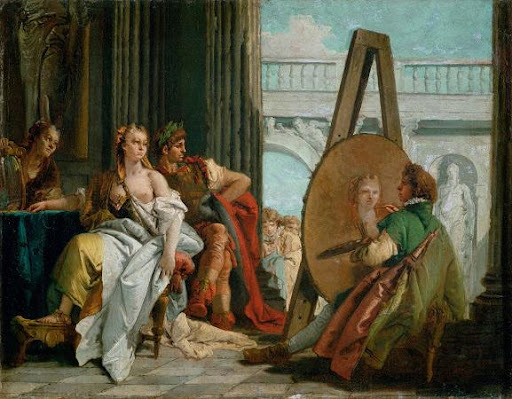
When trying to figure out how many sexual partners Alexander had, we must ask which were invented—or denied. Remember: ancient history wasn’t like modern (academic) history. It was essentially creative non-fiction. It inserted speeches, dialogue, even people and events to liven things up and/or to make a moral point. Or it obscured people and events, if that worked better.
Modern readers of ancient sources must always ask WHO wrote this, WHEN was it written, and what POINT did the author intend? Also, especially with anecdotes, look at the wider context. People are especially prone to take anecdotes at face value and treat them as isolated little tales. Yet CONTEXT IS KING.
A lot of our information about Alexander’s love life comes from Plutarch, either in his Life of Alexander or his collection of essays now called the Moralia. Another source is Curtius’s History of Alexander. And finally, Athenaeus’s Diepnosophistai or The Supper Party (really, The Learned Banqueters). All wrote during the Roman empire and had tropes and messages to get across.
Of the WOMEN associated with Alexander, I’m going to divide them into the historical and the probably fictional, or at least their relationship with Alexander was fictional.
Of the certain, we can count one mistress, three wives, and one probable secret/erased liaison.
Barsine is his first attested mistress for whom we have ample references across multiple sources. Supposedly, she bore Alexander a son (Herakles). Herakles certainly existed, but whether he was Alexander’s is less clear to me. As the half-Persian, half-Greek daughter of a significant satrap, she had no little influence. Monica D’Agostini has a great article on Alexander’s women, btw, in a forthcoming collection I edited for Colloquia Antiqua, called Macedon and Its Influences, and spends some time on Barsine. So look for that, probably in 2025, as we JUST (Friday) submitted the last of the proof corrections and index. Whoo! Anyway, Monica examines all Alexander’s (historical) women in—you guessed it!—their proper context.
Alexander also married three times: Roxane, daughter of the warlord Oxyartes of Sogdiana, in early 327. He married again in mid-324 in Susa, both Statiera (the younger), daughter of Darius, and Parysatis, youngest daughter of the king before Darius, Artaxerxes III Ochus. Yes, both at once, making ties to the older and the newer Achaemenid royal lines.
Out of all these, he had only one living son, Alexander IV (by Roxane)—although he got his women pregnant four times. If we can trust a late source (Metz Epitome), and I think we can for this, Roxane had a miscarriage while in India. Also, Statiera the younger was reputedly pregnant when Roxane, with Perdikkas’s help, killed her just a few days (or hours!) after Alexander died.
That’s 3 …who had baby #4?
Statiera the Elder, Darius’s wife. Netflix’s proposal of a liaison between them was not spun out of thin air. Plutarch—the same guy who tells us ATG never even looked at her—also tells us she died in childbirth just a week or three before the battle of Gaugamela, Oct. 1, 331. Keep in mind, Alexander had captured her right after Issos, Nov. 5, 333. Um … that kid wasn’t Darius’s. And if you think ANYbody would have been allowed to have an affair with such a high-ranking captive as the Great-King’s chief wife, I have some swampland in Florida to sell you. More on it HERE.
Now, for the probably fictional….
Kampaspe, I explained above.
Kallixena was supposedly hired by Philip and Olympias (jointly!) to initiate Alexander into sex, because he didn’t seem interested in women. (Yes, this little titbit is also in Rise.) Athenaeus reports the story as a digression on Alexander’s drinking, and how too much wine led to his lack of sexual interest. But within the anecdote, the reported reason for his parents’ hiring Kallixena was because mommy and daddy feared Alexander was “womanish” (gunnis).
Thaïs was linked to him by Athenaeus, almost certainly based on her supposed participation in the burning of Persepolis…which didn’t happen (or not as related; archaeology tosses cold water on it). Thaïs was Ptolemy’s mistress, and the mother of some of his children.
Athenaeus also mentions a couple unnamed interests, but all illustrate the same point: Alexander is too noble to steal somebody else’s love. Two are back-to-back: the flute-girl of a certain Theodoros, Proteas’ brother, and the lyre player of Antipatrides. The last is a boy, the eromenos of a certain Kalchis, a story related apart from the women, but with the same point.
Even more clearly fictional are his supposed encounters with the Amazon Queen Thalestris and Queen Kleophis of the Massaga (in Pakistan). Reportedly, as Onisikritos was reading from his history of Alexander at the court of King Lysimachos (who’d been a close friend, remember), Lysimachos burst out laughing when Onisikritos got to the Amazon story, and asked, “Where was I when this happened?”
Now, when it comes to his MEN/BOYS, the ice is thinner as no names are definitively given except Bagoas (in a couple sources, chiefly Curtius and Athenaeus). We also have a few generic references to pretty boys, as with Kalchis’s boyfriend mentioned above, and some slave boys offered by a certain Philoxenos, who he turns down, a story told by both Plutarch and Athenaeus.
Curtius alone suggests two more, but at least one is meant to show Alexander’s descent into Oriental Corruption(tm), so it’s possible Curtius made them up. At the very least, he used them for his own narrative purposes. Sabine Müller has a great article on this, albeit in German. Still, if you can read German: “Alexander, Dareios und Hephaistion. Fallhöhen bei Curtius Rufus.” In H. Wulfram, ed., Der Römische Alexanderhistoriker Curtius Rufus: Erzähltechnik, Rhetorik, Figurenpsychologie und Rezeption. Vienna: Austrian Academy of Sciences Press, 2016, 13-48.
Romans had a certain dis-ease with “Greek Love,” especially when it involved two freeborn men. Fucking slaves was fine; they’re just slaves. Citizen men with citizen boys…that’s trickier.
Curtius labels two youths “favorites,” a phrasing that implies a sexual affair. One is mentioned early in the campaign (Egypt) when Alexander is still “good”; the other after Alexander begins his slide into Persian Debauchery. These are Hektor, Parmenion’s son (good), and Euxinippos, described as being as pretty as Hephaistion, but not as “manly” (bad). Curtius employs Bagoas similarly, even claims he influenced imperial policy for his own dastardly goals. Gasp!
Yes, of course I’m being sarcastic, but readers need to understand the motifs that Curtius is employing, and what they really mean. Not what 21st century people assume they mean, or romantically want them to mean. (See my "Did Bagoas Exist?" post.)
What about Hephaistion? I’ve discussed him elsewhere in an article, but I’ll just remind folks that it’s nowhere made explicit until late sources, in large part because, by the time we meet Alexander and Hephaistion in the histories, they were adults, and any affair between them would be assumed to have occurred in the past, when they were youths. (See my “It’s Complicated” and a reply to them maybe being “DudeBros.”)
This is why we hear about Alexander’s interest in youths, not adult men. It would be WEIRD to the ancient mind (= Very Very Bad) if he liked adult men. In fact, by comparing Hephaistion to Euxinippos, Curtius slyly insinuates that maybe he and Alexander were still…you know (wink, wink). That’s meant to be a slam against Alexander (and Hephaistion)! Therefore, we cannot take it, in itself, as proof of anything. Alexander’s emotional attachment to Hephaistion, however, is not doubted by any ancient source.
So, all those people are attached to Alexander in our sources, but over half may not be real, or at least, may not have had a sexual relationship with him. There may be (probably are) some that simply didn’t make it into the surviving sources.
Yet I’ve mentioned before that we just don’t find sexual misconduct as one of Alexander’s named faults. Even Curtius and Justin must dig for it/make up shit, such as claiming Alexander actually used Darius’s whole harem of concubines or held a drunken revel through Karia after escaping the Gedrosian Desert. (Blue Dionysos and drag queens on the Seine at the Paris Olympics got nothing on his Dionysian komos!)
Drink, anger, hubris…he sure as hell ticked all those boxes. But not sex. In fact, a number of sources imply he just wasn’t that randy, despite his “choleric” temperament. Some of the authors credit too much drink (bad), others, his supreme self-control (good). He’s more often an example of sexual continence—as in the stories from Athenaeus related above. He also didn’t rape his captives, etc., etc.
Make of that what you like, but I find it intriguing.
#asks#Alexander the Great#Lovers of Alexander the Great#Alexander's Lovers#Hephaistion#Hephaestion#Bagoas#Barsine#Kampaspe#Kallixena#Statiera#Parysatis#Roxane#Thais#sexuality of Alexander the Great#Alexander the Great and sex#Alexander the Great and women#Alexander the Great and men#Classics#ancient Greek sexuality#ancient Greece#ancient Macedonia#Alexander x Hephaistion#Alexander x Hephaestion#tagamamnon
39 notes
·
View notes
Text

Month Ulûlu, day 13: There was a lunar eclipse. It was completely covered at the moment when Jupiter set and Saturn rose. During totality the west wind blew, during clearing the east wind. During the eclipse, deaths and plague occurred. - The Astronomical Diaries
#Something for the real alexander heads#yes i know that's not how lunar eclipses look#parysatis#331 bc#my art
13 notes
·
View notes
Text

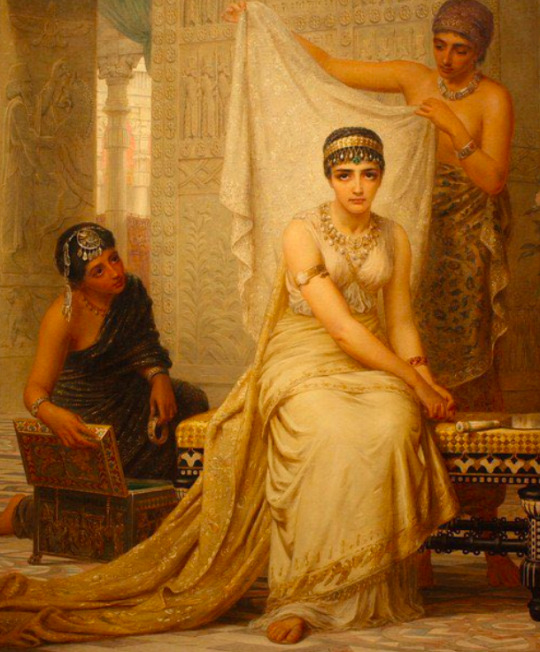

Rock relief of Artaxerxes III in Persepolis (aka Ochus) + The Dressing by L. Fitton + The Anabasis of Alexander by Arrian
4 notes
·
View notes
Text

HEY IM GOING TO THROW UPP
#i should NOT read this kinda shit at 12 am but here i am <3#yes i knowww hes her favorite her little baby boy i understand thsi but#keen to honour the memory of her beloved cyrus...im going to lose it parysatis im SO sorry uou do not deserve this#and fuckign ?? klearchos?? im goign to explode#biting biting biting tissaphernes shaking him like a fucking dog toy rn
2 notes
·
View notes
Text
happy mothers day to medea of colchis🔥🔥🔥🔥
3 notes
·
View notes
Text
i love that there's absolutely no explanation for why their mother preferred cyrus and got him excused after he was accused of trying to usurp + kill his brother the first time. she just liked him better
2 notes
·
View notes
Note
Ok, so In your response to my last spiel, you mentioned that Alexander will have a zero tolerance policy towards anything that may harm Reader and her the twins, including other wives.
It does make me wonder how Alexander would react to one of the wives (aka Roxanna 👀👀👀) trying to kill our girl. I keep picturing this scenario where it's a banquet, feast or some sort of get together with Alexander, Reader, Roxanna and maybe some of the generals. Long story short, Roxanna hands Reader a cup with a 'special' drink (ie she says promotes health, will help with the pregnancy etc). Reader, being as smart as she is, and knowing Roxanna's history, is automatically suspicious. To see if it's safe she either asks Alexander to 'taste' if for her or insists that Roxanna take the first sip. In either case, it results in Roxanna frantically slapping the cup out of Reader's hand before either she or her husband gets poisoned. At that point, everyone has noticed the commotion, and have realized that Roxanna has just tried to poison the Queen.
My question to you is this: what does Alexander do next? Lets assume reader is pregnant just to make thing extra spicy.
Since requests are open again, perhaps you could do it as a reaction blurb? I'll leave that up to you though. I'm just curious as to what you think would happen next.
Thanks, and hope you feel better ❤️!
--O-
❝ 📜— lady l: this was longer than I thought and I don't know if it's good, I liked it, but let me know your opinion, anon! Forgive me for any mistakes, love you! ❤️
❝tw: attempted murder, mention of poison, domestic violence (??), physical punishment and perhaps torture.
❝📜pairing: yandere!alexander the great x female!reader.
❝ 📜word count: 1,246.


It was supposed to be a happy and fun dinner.
Needless to say, that's not what happened.
You were sitting next to Alexander, being shown off as his beloved Queen and heavily pregnant. Everyone was hoping for an male heir and was happy for you, everyone except Roxanna who looked at you as if she wanted to stab you or, in this case, stab you in the stomach.
That scared the shit out of you.
You were already familiar with her story, about what she had done to Stateira and Parysatis, and you were afraid that she might try to do something to you and the baby.
You wouldn't let anything happen, though. Although you weren't excited about the pregnancy news at first, you warmed up to the idea and began to look forward to holding your baby in your arms. And you'd be damned if you let anyone try to take that away from you.
''Are you alright?'' Alexander leaned over and whispered in your ear. You looked at him and smiled, it was still strange calling him your husband, but you were getting used to it.
You gave a weak nod to his question.
Alexander frowned and placed his hands on your swollen belly. It was just a few months until the birth and he was so excited. He did want an heir, but he couldn't help but want to have a girl.
A little princess to love and spoil.
''We need to start choosing names.'' He joked, trying to ease your obvious tension, although he didn't know what was making you tense. Yet.
''I already gave you some choices.''
Alexander grimaced, ''Yes, you did and they are all horrible. What kind of name is Augustus?''
You laughed loudly, attracting attention. Augustus, yes, you had given him that option as a joke. Obviously you weren't going to name your child after the first Roman emperor, but it was fun to play with your husband about historical things.
''It's just a common name where I come from.''
''Hm...'' He half-closed his eyes and you touched his face gently, caressing him. Alexander purred and leaned into your hand.
This earned you a look of compassion and a furious, jealous look from Roxanna. You didn't notice and neither did Alexander, both too busy in your affection for each other.
''I love you.'' He murmured, looking into your eyes intensely.
You smiled at him, ''I love you too.''
''Let's make a toast!'' Nearchus' amused voice sounded and everyone turned to the admiral.
''A toast?'' Cassander asked with a loud voice looking into his cup of wine.
Nearchus laughed loudly and slapped his friend on the back, ''Yes. In honor of our beloved Queen, (Y/N).''
Nearchus didn't notice Roxanna's withering look at him. But you did and the pure hatred you saw in those dark eyes gave you goosebumps.
You knew that look and you knew nothing good was coming.
Everyone raised their cups, even your husband's second wife. You were the only one drinking water, even Hephaestion was drinking wine, and he was loose and happy. And that made you happy, you liked him and he was one of his closest friends and you hated seeing how haggard he seemed lately.
''I dedicate this toast in the name of our beloved (Y/N). Our Queen, sometimes soldier and friend.'' Everyone laughed as they remembered what you had done in the Indian Campaign, ''And the child she carries in her womb. May it come healthy and, regardless of gender, we will love and protect this child. To (Y/N) and the baby!''
''To (Y/N) and the baby!'' Everyone repeated and drank the wine in your honor, you laughed, feeling loved and took a sip of water.
You took a piece of bread and bit into it, satisfying your hunger. Roxanna looked at you and smiled. She took a clay jug and poured the thick, dark liquid into a cup and handed it to you.
You raised your eyebrows in doubt as you picked up the cup.
''It's for you. My doctor told me that it helps with pregnancy and helps the health of the baby and the mother.'' Roxanna explained, biting into a piece of bread.
You mentally scoffed. She didn't think you were that stupid, did she? It was insulting that she thought she could poison you in such a blatant way.
You decided to act quickly, ''Why don't you take a sip first?''
She furrowed her dark eyebrows, ''Excuse me?''
''It's a custom among my people that the person who gave you a cup must taste it first.'' You explained, handing her the cup.
Roxanna looked at the cup in your hands with hatred.
''Take it'' You encouraged her, ''or is there some reason why you don't want to drink it?''
Alexander turned his eyes to you and Roxanna, before he could ask what was going on, Roxanna slapped your hand, making you drop the strange liquid on the table.
The noisy room fell silent in a matter of seconds as Alexander stood up from his chair and fixed his eyes on Roxanna.
''What do you think you're doing?'' Alexander's voice was so cold, so lethal that you stiffened. He ignored you, focusing entirely on his second wife.
Hephaestion, who was sitting on Alexander's left side, stood up and touched the thick liquid on the table. He grimaced as the liquid stuck to his finger.
''That's...'' Perdiccas started to speak but couldn't finish.
''Poison?'' Ptolemy finished for his friend.
''How dare you?!'' Cassander growled, also standing up and glaring furiously at Roxanna. He never liked her, he wasn't oblivious to the hateful looks that Alexander's barbaric wife sent to you, to his friend. And now she tried to poison you.
Cleitus was still sitting, watching everything with a stony expression, but his hand was on the dagger stuck in his chiton. He was prepared to act, one word from you and Roxanna would be eliminated from the world.
Alexander still didn't take his eyes off Roxanna, but he spoke to you, ''Go to our room. I'll be there in a few minutes.''
You wisely decided not to disobey.
You stood up carefully and quickly looked around, watching all your friends, your husband, stare at Roxanna who looked terrified. You should have felt bad for her, but you didn't.
Not when she threatened the life of your unborn baby.
Once you were out of sight, Alexander addressed one of the guards stationed at the entrance to the hall, ''Take the whip.''
Roxanna's small body shook in fear at her husband's words. Her shaking legs gave way and she fell to her knees on the floor, feeling hot tears fall onto the dress she was wearing.
Alexander did not feel sorry. And neither do the others. She had brought this on herself.
Actions have consequences and punishments must be applied. And Alexander would not tolerate anyone threatening your life or that of his unborn child.
Alexander felt satisfaction fill his body as the guard brought out the whip and positioned himself behind a desperate Roxanna's back. He watched with satisfaction as the whip hit her sensitive skin and felt satisfaction when he heard her screams of pain.
Roxanna was to blame for her own pain and the scars that were forever marked on her skin were true proof of that.

#yandere history#history#yandere historical characters#the lost queen#yandere alexander the great#yandere alexander the great x reade#alexander the great x reader#yandere reaction#reaction#yandere blurb#blurb#imagine#i'm not sure#o- anon
688 notes
·
View notes
Text



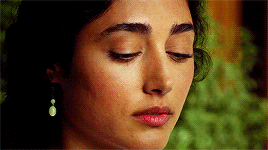

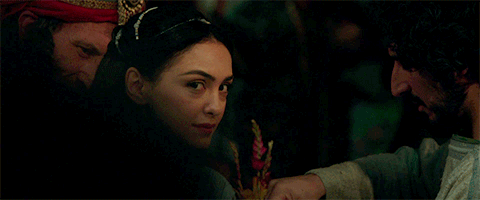
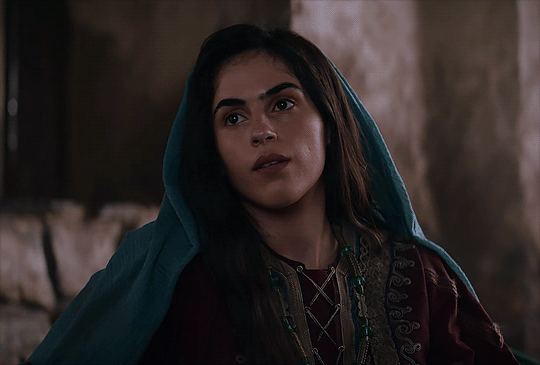

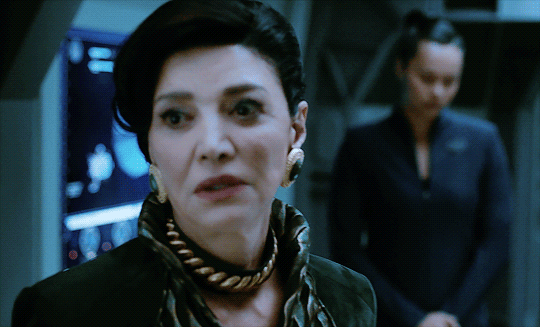
Alexander The Great Roxana
Stateira I Drypetis
Parysatis Stateira II
Olympias Sisygambis
Hephaestion Darius III
Philip II of Macedon Cleopatra 'Eurydice' of Macedon
Cleopatra of Macedon



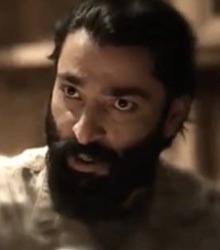




Fan cast Alexander The Great remake
#alexander the great#fan cast#jeremy allen white#havana rose liu#golshifteh farahani#yasmeen fletcher#nazanin boniadi#leem lubany#jennifer aniston#shohreh aghdashloo#Sebastian Croft#Theo James#Fahim Fazli#Ali Olomi#Zach Galifianakis#Ariane Labed#Adèle Exarchopoulos
26 notes
·
View notes
Note
(Teen wolf anon) Ok, another whump idea i got while writing the other one, though it might not be strictly Teen Wolf. I was watching a mystery series recently. In it the murderer is inspired by Parysatis, a Persian queen who supposedly killed a rival by using a knife with poison on only one side of the blade to cut a bird and thereby only half the bird was poisoned. I've been thinking that's be an awesome way to kill someone.
Oh.
Oh!
Nogitsune Stiles cutting an apple in half to share it with Scott with one side of the blade coated in wolfsbane! *Falls over and screams into a pillow*
YES
VOID VOID VOID VOID VOID
Sorry, anon, but you've awoken something inside me at the mention of the nogitsune. My absolute favorite villain who wreaked havoc on Beacon Hills. My man.
And ohhhhhh that's so interesting. I love that. Wow. Like, Void is just eating this apple all calmly, waiting for Scott's reaction to the wolfsbane, and Scott is very confused on how Void appears to be fine but he isn't. And oh man, the realization that that is Void and not Stiles? The sheer horror dropping into the pit of his stomach as he realizes he's been poisoned? Oh, so, so good. Thank you for sharing that!
6 notes
·
View notes
Photo

Portrait of Ancient Persia from the Hetalia manga series with his family (Persia belongs to Hidekaz Himaruya). His wives Bactria (far left), Parthia (second from left), and Media (far right), and his young daughter Iran. Persia did have additional territories he kept as concubines, but Media, Bactria, and Parthia were his main consorts. Media was Persia's first and primary wife. Media had once been a major power in the east and she never forgot that despite her short reign, often acting as though she was not a captured territory but an equal partner with her husband. During her time as an empire, she went toe-to-toe with the kingdoms of Lydia and Babylonia. When Persia rose to power after Cyrus the Great rebelled against and overthrew the Median monarchy, Media and her people were still treated with respect and given high positions at court. Her power and importance were retained no matter who ruled her; in fact, Greece considered Persian sympathizers to be "Medianized" rather than "Persianized." She was a scholar and scientist, fascinated with uncovering the mysteries of the world, and Persia relied heavily on her wisdom. Persian kings also were referred to as kings of "Persia and Media." Both Parthia and Bactria had been Media's handmaids before Persia took them as his wives. Bactria was deemed an exceptional beauty and was considered one of sixteen perfect Iranian lands created by Ahura Mazda, the chief god of Zoroastrianism. As her lands were always governed by the crown prince of the empire, Bactria was often tasked with guarding the king's heir-apparent. She was devoted to Persia and, when Alexander the Great and Macedonia showed up and caused trouble, Bactria was the first to begin rebellions against the invaders. When she, herself, was captured and forced to adopt Greek customs, she spied on her Hellenistic rulers and reported back to Persia until she was able to dismantle the Indo-Greek kingdom. She also sometimes encountered China (who called her "Daxia") and became an important business partner of his in the Silk Road. Parthia was always an ambitious woman. Despite having spent a long time as an underling for Media, and, later, a secondary wife for Persia, she schemed for many years to be the dominant nation in the region. When Persia began to experience trouble after Alexander's generals carved up the empire, Parthia saw her opportunity to establish her own empire. She was relentless and vicious in her expansion, even threatening Rome on multiple occasions. Her aims were not entirely selfish, though, as she used her empire-building as a chance to keep Persia alive; though she had him locked in his quarters until he managed to sneak away and rise to power once more as the Sasanian Persian Empire. Little Iran (whose human name was "Parysatis," though she later changed it to "Parisa") would one day take on her father's legacy as a great empire. When Persia was killed during the Muslim conquest, little Iran was taken in by the Umayyad Caliphate, who treated her as inferior because she wasn't an Arab and refused to abandon her Persian culture. Iran never forgave her father's murderer and eventually overthrew him in support of the new Abbasid Caliphate. She eventually grew frustrated with the Abbasids, too, and began rebelling at any opportunity. Throughout the constant changing of power and the invasions, Iran clung to memories of her father and did everything she could to preserve his culture. It was during the Mongol invasion and rule that the last shreds of Iran's innocence ended, leaving her a very hard and angry young woman. The death and destruction she witnessed scarred her for the rest of her life. She eventually managed to rise above the conquests to become the Safavid Empire (and, later, the Afsharid Empire), so strong and powerful that she terrified both the Ottoman and Mughal Empires. Dynastic changes, civil wars, the slaughter of rebellious khanates, WWII, interference from foreign countries, and an outright revolution led her to become what she is today. Despite being quick to anger, she is deeply intelligent and loves learning, dedicating much of her free time to studying anything she can - even things her current bosses might not approve of.
#hetalia#Axis Powers Hetalia#historical hetalia#hetalia fanart#hetalia fanfiction#aph persia#hetalia persia#aph ancients#aph iran#hetalia iran#hetalia oc#redbayly
10 notes
·
View notes
Text
MEMORIAS DE UN GUERRERO PERIPATÉTICO
Imagina a un joven combatiente, que sale a recuperar territorios que pertenecían al reinado de su padre, Filipo, cobijado por grandes guerreros que además fueron sus maestros.
Imagina ahora a un príncipe estudiante, de la mano del mismo Aristóteles, que le enseña a reflexionar e imaginar un mundo mejor.
Imagina ahora que ese joven guerrero no para de conquistar y va sembrando ciudades por doquier e imaginando cómo lograr que la gente viva mejor. Todo un peripatético, en honor a su ilustre maestro.
Si lo lograste imaginar, ya tienes en tu mente al gran Alejandro de Macedonia. Por ello, a continuación, te presento el resumen de una magistral obra de Mary Renault, enfermera, que vio por primera vez la luz en Londres en 1905 y fallecida en Ciudad del Cabo, a los 78 años.
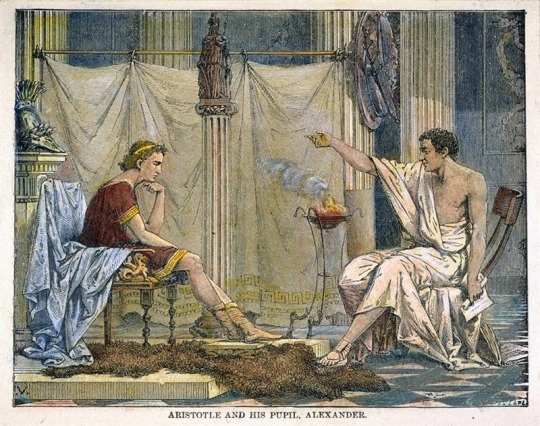
EL MUCHACHO PERSA
Mary Renault
Editorial Grijalbo, 1972
Penguin Random House
426 páginas
28 capítulos.
Argumento
Vida de Alejandro Magno
Narrador:
Bagoas, un joven persa, aristócrata, capturado a los 5 años, castrado y vendido como esclavo a Datis, quien lo sodomizó desde los 12 años. Luego vendido a Dario III, rey de Persia.
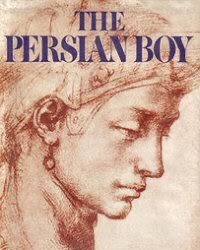
Personajes, por orden de aparición:
Bagoas
Oromedón, instructor
Dario III
Artabazos
Doriskos
Bessos, el traidor
Nabazanes, el padrino
Alejandro
Hefaiston, su amigo de la infancia, también guerrero, general.
Bucéfalo
Perias (el perro)
Olimpia, la reina madre
Kleitos, uno de los dos generales de más confianza.
Filostrato, Filósofo y maestro de la corte
Kalistenes, cronista enviado de Aristóteles
Roxana, la esposa sogdiana
Los filósofos desnudos de Nyza, India.
El rey Poros derrotado, pero recompensado.
Kalanos, el pensador gurú indio que lo siguió hasta Babilonia.
Barsine-Estatira, hija del rey Darío III, segunda esposa.
Parysatis, hija del rey Artajerjes III.
Sitios de la narración:
- Susa
- Babilonia
- Persepolis
- Ecbatana
- Zadrakarta
Frases destacadas:
1. Fui educado en el honor, a montar, a utilizar las armas y a aborrecer las mentiras.
2. En casa me habían enseñado que, después de la cobardía y la mentira, la peor desgracia que podía acontecerle a un hombre era el comercio de si mismo.
3. El conocimiento puede alterar la memoria.
4. Lo cierto es que, a pesar de que el hombre sabio es consciente de que toda belleza nace para morir, a uno no le gusta que se le recuerden tales cosas.
5. Cuando mi sepulcro se abriera, me enfrentaría con un destino desconocido, como el niño encerrado en las entrañas de su madre.
6. En los llanos suele ser mejor el vino. Cuando el agua es mala el vino es bueno.
7. El polluelo vivo en el interior del cascarón no conoce ningún otro mundo. A través de las paredes del mismo observa una blancura pero no sabe que se trata de la luz. Y, sin embargo, golpea la blanca pared sin saber por qué. Un rayo le alcanza el corazón y el cascarón se abre. (Capítulo 11).

8. Tu vino es demasiado fuerte para beberlo con frecuencia, querido mío.
9. Un rey —decía el libro de Jenofonte en alguna parte— no sólo debe demostrar ser mejor que aquellos a quienes gobierna sino que debe arrojar sobre éstos una especie de hechizo.
10. No hay nada comparable a hacer feliz al que se ama.
11. Hay que vivir como si fuera para siempre y como si se pudiera morir en cualquier momento. Siempre las dos cosas a la vez.
12. En Macedonia cualquier hombre libre puede hablar cara a cara con su superior; cualquier superior u hombre libre puede hablar con el rey.
13. El fin y el objeto de la conquista, es evitar hacer lo mismo que los vencidos. Cuando conquistamos una región debemos demostrar ser mejores legisladores que aquellos a los que hemos vencido.
14. Al convivir con filósofos de la India, uno de ellos le responde: “A los hombres los has cambiado ciertamente. Por ti han conocido el miedo y la cólera, el orgullo y el deseo, las cadenas que apresarán sus almas a lo largo de muchas vidas. Y a ti, que te crees libre porque has dominado el temor y las codicias corporales, los deseos del espíritu te consumen como un fuego abrasador y pronto arderás en ellos.”
15. Otro de ellos le dijo” «Hasta los dioses se cansan de su divinidad y buscan alivio al final. Iré contigo hasta que seas liberado».
16. Ahora sólo vivía para avanzar hacia el Ganges, seguir su curso y alcanzar el Océano Circundante. Su imperio sería una obra acabada de mar a mar, coronada por una maravilla.
17. Alejandro siempre decía que todas las cosas buenas había que pagarlas.
Críticas al libro:
Triste y a la vez noble historia de un joven mancebo persa, de familia aristocrática, poblada de hechos históricos de la antigua Persia, la tierra del mismísimo Ciro y fecunda relación de las hazañas y del carácter de Alejandro.
Destaca en este bello libro la descripción del antiguo palacio imperial de Babilonia, con su alberca bañada de agua del mismo Éufrates, calentada por filtros de sol, de paredes de oro e incrustaciones de lapizlazuli, rodeado de finas plantas y sofás con cojines de lino.
Me gusto el episodio donde el muchacho persa se defiende de un depredador y con su agilidad utiliza su daga para deshacerse de él aunque no puede parar de acuchillarlo en el corazón repetidas veces hasta que escucha una voz que le dice que ya se detenga.
Sorprende como un hijo de la antigua Macedonia, sucesor de Filipo II, alumno de Aristóteles, destaque tanto en su espíritu guerrero, logrando expandir el pequeño reino de su padre al enorme territorio persa y hacia la parte norte de India, la extensión más grande jamás pensada, permitiendo difundir la cultura Helénica por los siguientes 300 años.
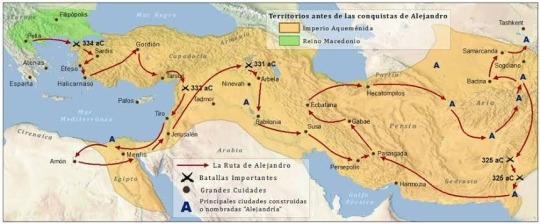
En la novela, Bagoas tiene 15 años cuando inicia su relación con Alejandro, que tenía unos 26. Renault describe la relación hasta su final, la muerte de Alejandro, cuando Bagoas tiene unos 22 años y Alejandro 33.
Sin duda es grato encontrar en el libro un buen espacio para Bucéfalo (su fiel corcel) y para Peritas (su fiel perro) lo cual transmite la nobleza de corazón de este controvertido hombre.
Otro pasaje hermoso, sin duda, es cuando Alejandro en una noche de pasión, presenta a Bagoas nada menos que el poema de la Iliada de Homero, lo cual es sin duda ninguna un gesto de alta sensibilidad de la escritora. Dicen que decía Alejandro, “Oh, qué afortunado el joven Aquiles, que encontró en Homero el heraldo de su gloria.”
Parece ser que Mary Renault elige también ser juglar de las hazañas de Alejandro y ayudar a cumplí su sueño de ser recordado para siempre.
La muerte de Clito el maestro de las artes militares del propio Alejandro, atravesado por la furia de una lanza, impregnada del rencor por haber sido recriminado por su creciente autocomparación con los dioses y su extremada orientalización y además impregnado del efecto del maldito alcohol en exceso, marca sin duda el inicio de su caída, en aquel fastuoso banquete de Samarcanda.
El regreso de la India a Persia, después del amotinamiento de sus tropas y la muerte de su amado Hefestion, trajo numerosas desilusiones (traiciones, robos, abusos) de sus supuestos hombres nobles agradecidos y nobles gobernantes, que seguramente hicieron sangrar su generoso espíritu. Percatarse de la fragilidad y la podredumbre humana nunca ha sido agradable.
Otro pasaje interesante es la presencia constante de la madre (la reina Olimpia) que desde su lejanía en Epiro Macedonia, parece actuar como la consciencia de Alejandro, llamándole la atención, guiándolo o recriminándole algo, a pesar de ser el Rey. Tal vez por eso Alejandro nunca volvió a su lado.
Conviene honrar la memoria y recordar que Aristóteles nació en el año 384 a.C., quien a diferencia de Sócrates o Platón, no era ateniense, sino que era de una región del norte, era un macedonio. El futuro filósofo nació en un pueblo llamado Estagira y su padre era el médico de la corte de Filipo II, Rey de Macedonia. Si bien que fue formado en Atenas desde los 17 años, en la Academia del mismo Platón, después de 20 años de formación regresa a Macedonia donde realiza numerosos estudios de Biología y se encarga oficialmente de ser el tutor por 5 años del joven heredero al reino de Macedonia: Alejandro Magno. En el año 335 a.C. volvió a Atenas para fundar su propia escuela, el Liceo, que se conviritió en competencia directa de la Academia de Platón. La escuela se conocerá como peripatética y a sus estudiantes se les llamará peripatéticos.
Grata paradoja da la vida, porque el mismo Alejandro fue un peripatético que meditaba entre batalla y batalla y sobre todo tras las batallas. La mayor enseñanza de Aristóteles era que el conocimiento se aprende a través de la experiencia, una materia que bien aprendió el joven conquistador. Tal vez sus numerosas Alejandrías eran un tributo a su antiguo maestro de quien nunca se olvidó, ya que después de cada batalla enviaba colecciones de flora y fauna para que continuara sus estudios.
En los días antes de morir tenía fiebre persistente, respiración acelerada y áspera, dolor del mismo costado de la herida de la flecha Malí, luego tos, sangre y debilidad. Un cuadro que parece una triste Neumonía, como recordándole la vida que los no dioses mueren como lo hacen los hombres, como simples mortales.
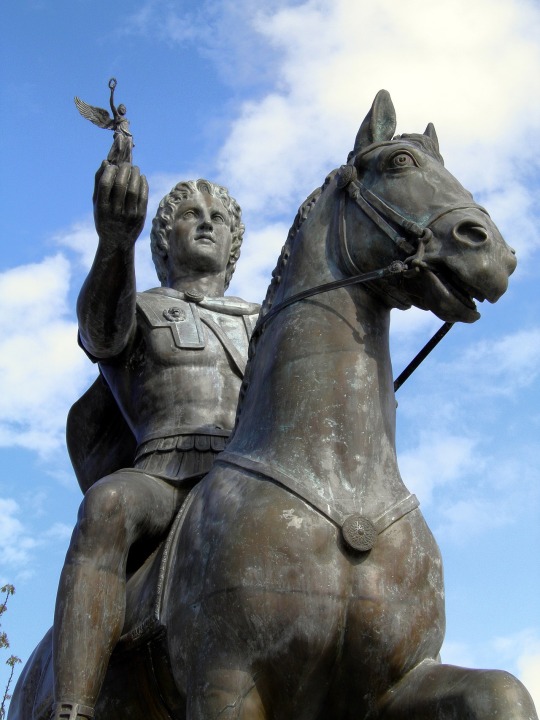
Y al día siguiente de su último suspiro, llegaron los encargados, lo trataron como a un rey, lo embalsamaron como a un gran soberano, un semidiós. Era el 13 de junio del 323 A.C., a sus 33 años, y lo cubrieron de mirra.
Resumido para ti por: El Búho Literato
0 notes
Text
cyrus and parysatis are mother-son relationship goals fr i wish my mom loved me that unconditionally
#im so normal about them im so normal#and then my mom gets senselessly angry with me and wont listen to me and i get eben MORE normal about them 🥰
5 notes
·
View notes
Text

Dating Starly night
The Pretty girl in pink is Parysatis, Alexander the Great’s 3th wife
0 notes
Photo

All of Parysatis in disguise's Greek friends are too nice... she needs a friend that just trash talks her. 10 stades is basically a mile lol
12 notes
·
View notes

